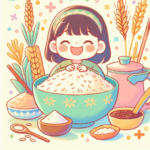Exploring the Spiritual Connections Between Ingredients and Japanese Food Culture
Japanese food culture is rich not only in flavor but also in spiritual connections and cultural significance. Each ingredient harbors deep symbolism and spirituality, weaving history, beliefs, and harmony with nature into the food we consume. This article delves into the invisible spiritual elements embedded in Japanese food culture through specific ingredients.
Harmony of Ingredients and Nature
A fundamental aspect of Japanese food culture is its close relationship with nature. Ingredients harvested seasonally are not merely sources of nutrition; they are revered as the gifts of the Earth. For instance, matsutake mushrooms are considered a divine offering from the mountain spirits, symbolizing abundance for many. With a short harvesting season, this precious ingredient evokes a mystical connection with nature.
Moreover, rice, a staple for the Japanese, is imbued with gratitude. Rice cultivation is regarded as sacred, and during harvesting festivals and religious rituals, rice is offered to the gods. The harvest of rice symbolizes prosperity and abundance, creating a profound awareness of the connection between nature and humanity.
The Symbolism of Ingredients
In addition, Japanese food culture is characterized by the deep symbolism inherent in each ingredient. For example, tai (sea bream) is known as a fish of success, often gracing celebratory occasions. Its vibrant color and shape are believed to bring about success and happiness. Thus, ingredients are not mere vessels; they are imbued with special meanings.
Another indispensable element of Japanese cuisine is kombu, symbolizing longevity and prosperity. Kombu is particularly common in special events like New Year’s and weddings, as it connects with the word “yorokobu,” meaning “to rejoice.” The choice of ingredients reflects profound beliefs and philosophies embedded in the culture.
The “Heart” in Japanese Cuisine
Japanese cuisine is about more than just enjoyment of taste; it also places a significant emphasis on “heart.” The cooking process is characterized by respect for ingredients, carefully crafted through time and effort. For instance, dashi is fundamental in Japanese cooking, deriving its umami from kombu and katsuobushi. The act of preparing dashi itself is often perceived as a special spiritual undertaking. Thus, eating is not merely about nutrition; it is an act of expressing gratitude.
Sharing meals strengthens bonds between individuals and fosters a culture that values the time spent together. Gathering around the table with family and friends is seen as a precious moment to reaffirm feelings of gratitude and love, another aspect of Japan’s spiritual character.
Conclusion: Life Accompanied by Ingredients
Japanese food culture transcends culinary techniques and flavors, encompassing the spiritual meanings and cultural values inherent in ingredients. The ingredients we consume daily encapsulate our connections with nature, family, and friends, enriching our lives profoundly. This spiritual fulfillment derived from food forms the essence of Japanese cuisine, shaping an integral part of our identity as Japanese people. It is a culture we must continue to cherish and uphold for generations to come.
By understanding these spiritual connections, readers can appreciate the richness of Japanese food culture more deeply. Engage with your ingredients, celebrate the essence they represent, and savor the cultural heritage that each meal embodies.


